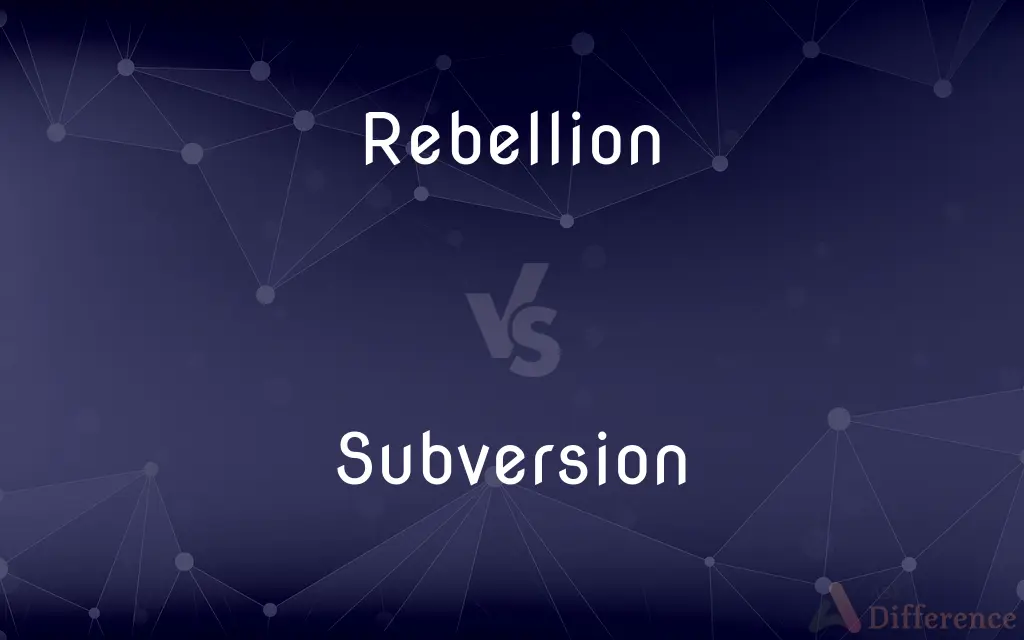Rebellion vs. Subversion — What's the Difference?
By Tayyaba Rehman & Fiza Rafique — Updated on March 13, 2024
Rebellion is an open refusal to obey authority, often through armed resistance, while subversion is a covert undermining of authority or systems.

Difference Between Rebellion and Subversion
Table of Contents
ADVERTISEMENT
Key Differences
Rebellion is a direct, often violent action against authority or government, characterized by its visible and confrontational nature. Individuals or groups that engage in rebellion seek to challenge or change the status quo through noticeable acts of defiance, which can include protests, riots, or even armed conflict. On the other hand, subversion is a subtle, often secretive strategy aimed at weakening or undermining authority, government, or societal norms from within. Subversion includes acts such as espionage, propaganda, and the gradual infiltration of institutions to change them internally.
While rebellion aims at an immediate and overt disruption of the current system, subversion works slowly and stealthily, making it harder to detect and counter. Rebels make their intentions and grievances known publicly, rallying support through visible opposition. In contrast, subverters operate under the radar, using deception and manipulation to achieve their goals, often without the broader public being aware of their actions.
The goal of rebellion is typically to overthrow or force change upon the existing power structures through direct confrontation. Rebels seek to mobilize public support and create significant pressure on authorities to respond to their demands. Whereas, subversion seeks to erode the legitimacy and functionality of a system from within, potentially preparing the ground for more overt forms of confrontation or facilitating a change in power without widespread conflict.
Rebellion often requires a significant level of organization, resources, and public support to sustain its activities and achieve its objectives. The visibility of rebellion makes it vulnerable to suppression by those in power. Subversion, by nature, requires less overt organization and can be carried out by individuals or small groups with minimal resources, making it a strategy often employed when open resistance is too dangerous or likely to fail.
Rebellions are historically significant events that can lead to rapid changes in political, social, or economic structures. They are moments of collective action that reflect widespread dissatisfaction with the status quo. Subversion, while less dramatic, can lead to profound changes over time, subtly shifting perceptions, policies, and power dynamics without the immediate upheaval associated with rebellion.
ADVERTISEMENT
Comparison Chart
Nature
Overt and often violent
Covert and stealthy
Strategy
Direct confrontation
Indirect undermining
Goal
Overthrow or force change
Erode legitimacy and functionality
Operation
Public and requires support
Secretive and can be solitary
Outcome
Rapid and noticeable change
Gradual and subtle change
Compare with Definitions
Rebellion
A deliberate act against authority, often involving violence.
The rebellion in 1857 sought to overthrow colonial rule.
Subversion
The act of undermining the power and authority of an established system.
The spy was accused of subversion for leaking secrets.
Rebellion
A movement aimed at radical change in society or government.
The rebellion gathered thousands, calling for democracy and freedom.
Subversion
A strategy to destabilize or overthrow a system from within.
Subversion tactics included spreading disinformation.
Rebellion
An uprising or revolt against a government or leader.
The rebellion was quashed by the military within weeks.
Subversion
The use of underhanded tactics to achieve political goals.
The group's subversion of the election process alarmed authorities.
Rebellion
The act of resisting or defying rules or norms.
The artist's rebellion against traditional styles revolutionized the genre.
Subversion
Efforts aimed at eroding confidence in leaders or institutions.
The campaign's subversion eroded the president's support.
Rebellion
A refusal to accept control or authority, leading to conflict.
Teenage rebellion against parental rules is common.
Subversion
The act of subtly corrupting or altering beliefs and systems.
The novel's theme was the subversion of societal norms.
Rebellion
Rebellion, uprising, or insurrection is a refusal of obedience or order. It refers to the open resistance against the orders of an established authority.A rebellion originates from a sentiment of indignation and disapproval of a situation and then manifests itself by the refusal to submit or to obey the authority responsible for this situation.
Subversion
Subversion (from the Latin word subvertere, 'overthrow') refers to a process by which the values and principles of a system in place are contradicted or reversed in an attempt to transform the established social order and its structures of power, authority, hierarchy, and social norms. Subversion can be described as an attack on the public morale and, "the will to resist intervention are the products of combined political and social or class loyalties which are usually attached to national symbols.
Rebellion
An act of armed resistance to an established government or leader
The authorities put down a rebellion by landless colonials
The Bretons rose in rebellion against the King
Subversion
The act or an instance of subverting.
Rebellion
Open, armed, and organized resistance to a constituted government.
Subversion
The condition of being subverted.
Rebellion
An instance of this.
Subversion
(Obsolete) Overthrow or ruin.
Rebellion
Defiance toward an authority or established convention
An act of adolescent rebellion.
Subversion
(obsolete) The act of subverting; overturning; flipping from beneath.
Rebellion
An instance of this.
Subversion
The act of overthrowing a government or a ruler; dethronement.
Rebellion
(uncountable) Armed resistance to an established government or ruler.
The government is doing its best to stop rebellion in the country.
Subversion
The condition of being subverted.
Rebellion
(countable) Defiance of authority or control; the act of rebelling.
Having a tattoo was Mathilda's personal rebellion against her parents.
Subversion
A systematic attempt to overthrow a government by working from within; undermining.
Rebellion
(countable) An organized, forceful subversion of the law of the land in an attempt to replace it with another form of government.
The army general led a successful rebellion and became president of the country.
Subversion
A revision considered more similar to preceding subversions than a revision deemed a new "version" is to preceding versions.
Rebellion
The act of rebelling; open and avowed renunciation of the authority of the government to which one owes obedience, and resistance to its officers and laws, either by levying war, or by aiding others to do so; an organized uprising of subjects for the purpose of coercing or overthrowing their lawful ruler or government by force; revolt; insurrection.
No sooner is the standard of rebellion displayed than men of desperate principles resort to it.
Subversion
The act of overturning, or the state of being overturned; entire overthrow; an overthrow from the foundation; utter ruin; destruction; as, the subversion of a government; the subversion of despotic power; the subversion of the constitution.
The subversion [by a storm] of woods and timber . . . through my whole estate.
Laws have been often abused to the oppression and subversion of that order they were intended to preserve.
Rebellion
Open resistance to, or defiance of, lawful authority.
Subversion
Destroying someone's (or some group's) honesty or loyalty; undermining moral integrity;
Corruption of a minor
The big city's subversion of rural innocence
Rebellion
Refusal to accept some authority or code or convention;
Each generation must have its own rebellion
His body was in rebellion against fatigue
Subversion
The act of subverting; as overthrowing or destroying a legally constituted government
Rebellion
Organized opposition to authority; a conflict in which one faction tries to wrest control from another
Common Curiosities
What is the main difference between rebellion and subversion?
Rebellion is an open, often violent, act against authority, while subversion is a covert effort to undermine or weaken a system.
Can subversion lead to rebellion?
Yes, subversion can erode the legitimacy and functionality of a system, potentially setting the stage for rebellion.
Are rebellions always violent?
While many rebellions involve violence, not all do. Some can be largely peaceful protests or civil disobedience.
Is subversion always negative?
While often viewed negatively, subversion can be seen as positive if it aims to correct injustices or promote beneficial changes.
Can a rebellion be justified?
The justification of a rebellion often depends on perspective, with those rebelling viewing it as necessary against perceived injustice or tyranny.
What are common tactics of rebellion?
Common tactics include protests, strikes, riots, and armed conflict.
How do governments detect subversion?
Governments use intelligence and surveillance to detect and counteract subversive activities.
How do authorities typically respond to subversion?
Authorities may respond to subversion with surveillance, counterintelligence, and efforts to reinforce the legitimacy of the system.
Can subversion be a form of protest?
Yes, subversion can be a form of protest, especially when direct opposition is too dangerous.
Can subversion be legal?
Some forms of subversion, like spreading dissenting ideas without breaking the law, can be legal, though often frowned upon by authorities.
How do subverters operate?
Subverters often operate through propaganda, espionage, and the infiltration of institutions to enact change from within.
What role does public support play in rebellion?
Public support is crucial for sustaining a rebellion and legitimizing its cause.
Share Your Discovery

Previous Comparison
Lacquer vs. Sealer
Next Comparison
Ship vs. ArkAuthor Spotlight
Written by
Tayyaba RehmanTayyaba Rehman is a distinguished writer, currently serving as a primary contributor to askdifference.com. As a researcher in semantics and etymology, Tayyaba's passion for the complexity of languages and their distinctions has found a perfect home on the platform. Tayyaba delves into the intricacies of language, distinguishing between commonly confused words and phrases, thereby providing clarity for readers worldwide.
Co-written by
Fiza RafiqueFiza Rafique is a skilled content writer at AskDifference.com, where she meticulously refines and enhances written pieces. Drawing from her vast editorial expertise, Fiza ensures clarity, accuracy, and precision in every article. Passionate about language, she continually seeks to elevate the quality of content for readers worldwide.













































